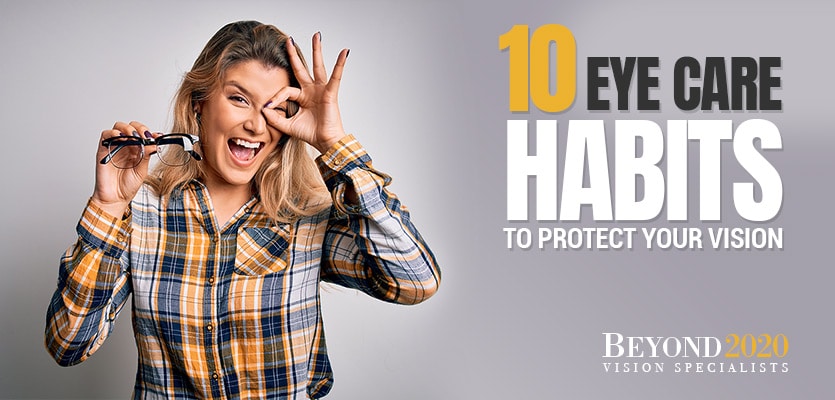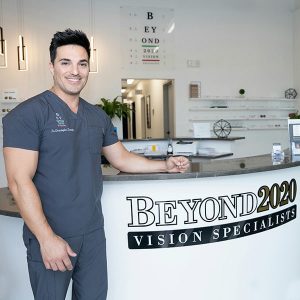10 Eye Care Habits to Protect Your Vision
Home » 10 Eye Care Habits to Protect Your Vision

10 Eye Care Habits to Protect Your Vision
1. Eat Well
A good diet does more for your body than maintain your weight and heart health. In fact, eating well is vital to protecting your vision. Foods like tuna, salmon, kale, spinach, and carrots are packed full of vitamins proven to help keep your eyes healthy.
Hydration of the body is also a great way to battle dry eyes. Dry eye disease or (DES) is a chronic condition that optometrists see all too often. A holistic way for patients to mitigate this is to keep your body hydrated. Water is the beverage of choice and drinking water throughout the day is great for the eyes and overall general health.
2. Wear Sunglasses and Goggles
It’s no secret that harmful ultraviolet (UV) rays can damage your skin and may cause cancer, but you can’t pour sunscreen into your eyes. Wearing sunglasses to block UV rays can help keep your eyes healthy in the long run. Look for sunglasses with a UV protectant sticker to ensure sufficient blockage.
There’s a reason why construction workers and scientists wear protective goggles when they perform their work. If you’re partaking in activities that may cause eye injuries, be sure to wear some goggles for protection, so you’ll be ready in the event something unexpected happens.
3. Rest Your Eyes
Now more than ever, we spend significant portions of our day staring at a screen because of work or leisure. Whatever the reason for screen gazing, it’s essential that you take frequent breaks to avoid eye strain that can cause vision damage. If you spend large blocks of time in front of a screen, consider blue light glasses to help minimize the strain.
4. Quit Smoking
5. Get Your Eyes Checked
6. Exercise Regularly
Exercise does more for your body than you realize. In fact, not only does regular exercise maintain a healthy weight and heart health, recent studies show that voluntary exercise also helps to stave off eye disease that can cause vision loss. For most, an average of 30 minutes 5 times per week is sufficient to sustain your health.
7. Get Some Sleep
A lack of sleep can cause many problems, including brain fog, weight gain, memory problems, high cholesterol, and poorer vision. When your eyelids feel heavy, your vision can also become blurry. The blurrier your eyesight, the harder you’ll strain when trying to read or look at something. If you find yourself searching the pantry for toothpicks to pry your eyes open, it’s time to get some shut-eye.
8. Pay Attention
It’s important to pay attention to what your body is trying to tell you. If you find yourself squinting to see something you had no prior trouble viewing, or if your vision suddenly becomes blurry, it’s time to talk to your optometrist. Your body’s physical cues are the best indicator something is amiss, and it will do your vision no good to ignore the problem.
9. Wash Your Hands
If there’s one thing the pandemic proved, it’s that people did not wash their hands nearly as often as they should have been before it began. To keep germs at bay, it’s best to wash your hands for at least 20 seconds. And, of course, avoid touching your eyes as much as possible to prevent infection.

